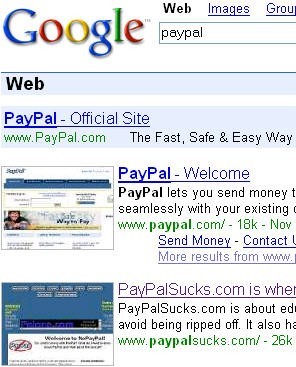When most people think branding, they think about what happens offline. The familiar names of large corporations come to mind when slogans like “When it absolutely, positively has to be there overnight…”, “You’re in good hands with…”, “It’s everywhere you want to be”. You can quickly see that these are instantly recognizable companies and brands. When you think tissues, it’s Kleenex. When you think computer chips, it’s Intel.
Online, however, business owners tend to neglect this important aspect of their ebusiness. This can be a deadly mistake as you’ll see with the few real-life illustrations. Online, people are looking for reasons to trust your business. They form quick opinions based on surrounding search results. If any doubt is cast on it, they could end up buying from someone else.
Let’s say you run a retail outlet. Imagine how your customers would feel if there was an irate customer at the service desk shouting or yelling out about the poor service/product he/she got. What will they think? As a business, damage control is vital to keeping your good name, even if you’ve made an honest mistake. Some people don’t forget easily and carry the chip on their shoulder long after the incident is over. Bad word of mouth spreads much faster than good word of mouth, and that’s a nuance of human nature.
A high profile target of bad publicity is President George W Bush. A search for the term “failure” yields the his white house biography.
LogoWorks, a leading online logo provider, encountered bad press online from discussions about how they copied Delta’s logo and sold it cheap to its customers. While it was an honest mistake from the point-of-view of the owner, the damage was done. Sales plummeted because the discussion was picked up by Google and ranked alongside their site in the top ten results.
Home Depot, the home improvement store, had to deal with an unhappy customer who created a site called homedepotsucks.com. The site no longer ranks but you can bet it hurt sales while the negative publicity was clearly visible in the top ten rankings early for several months starting last year. People who buy their goods from Home Depot will surf over to see what is on that site just out of curiousity. Home Depot learned its lesson and appears to have registered homedepot-sucks.com.
In a more recent example, Paypal is currently the target of bad publicity. Just type in “Paypal” and paypalsucks.com is ranked #2! Not a good start if you’re trying to earn trust from new merchants.

Just to see how rampant this behavior really is, if you use the Google operator inurl by entering “inurl:sucks.com” without the quotes in Google, you’ll see that there are about 36,000 sites with the word sucks in the url. Just previewing the first 100 sites alone reveals companies like Paypal, Disney, Target, Ford, Compass Bank and even Bill O’Rielly have the word sucks after it.
We wonder what the true motives of setting up such sites are: whether it is for public service, or to slander the company, or simply to make money off of it. Whatever their motives are, these sites exist and their appearance must be dealt with if the company is adversely affected by it.
The cheap way is preventative management. Before anyone can register yourdomain-sucks.com or yourdomainsucks.com, you do it first. Sure, you’ll have to put up the cost of the domain registration but the domain remains forever unavailable as long as you own it. Also take into consideration variants on a domain like home-depot.com.
Once the problem arises, however, it could prove to be an expensive and/or tedious task to have those results removed or pushed down by complimentary results of your other business units or supplier/customer sites. It could also be costly to have an attorney send cease and desist letters to the owner. You might even have to resort to buying the domain for a hefty price (maybe that’s what they wanted to accomplish in the first place).
Catherine Seda discusses Using Search for Public Relations & Reputation Management at Search Engine Watch. She brings up another example of reputation management that must be handled promptly and effectively or it could turn into a public relations nightmare. In this case, the target is Walmart. She also advocates a proactive approach in branding and online reputation management through outlets like PR which has helped companies like Southwest Airlines and Verizon Wireless.
Admin says
Another interesting case of brand mis-management online with Dell. This time blogs are reportedly the culprit. Get the story at NetImperative.